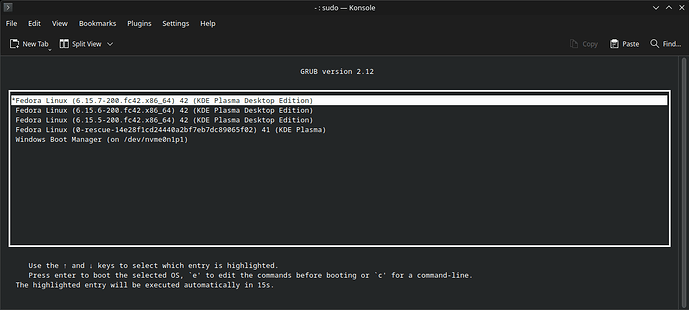I had a brilliant comment that demonstrated the differences between my brother’s configuration and mine, considering that they are identical except for GPU, yet his has the Windows Bootloader entry visible in GRUB’s TUI. However, it broke Discourse’s renderer:
Here's something to make y'all think!
| Mine | My Brother's | |
|---|---|---|
kinfo |
|
|
sudo tree /boot/efi |
|
|
cat /etc/default/grub |
|
|
sudo fdisk -l /dev/nvme2n1 |
|
|
sudo grub2-emu |
At least you all know it doesn't appear for me. I don't think |
Notice the “Windows Boot Manager”?! |
Consequently, you’ll need to duplicate the CommonMark that’s been posted there into a renderer, like the comment editor here:
<p>Here's something to make y'all think!</p>
<table>
<thead>
<tr>
<th></th>
<th>Mine</th>
<th>My Brother's</th>
</tr>
</thead>
<tbody>
<tr>
<th><code>kinfo</code></th>
<td>
~~~YAML
Operating System: Fedora Linux 42
KDE Plasma Version: 6.4.3
KDE Frameworks Version: 6.16.0
Qt Version: 6.9.1
Kernel Version: 6.15.7-200.fc42.x86_64 (64-bit)
Graphics Platform: Wayland
Processors: 12 × AMD Ryzen 5 7600X 6-Core Processor
Memory: 32 GiB of RAM (30.4 GiB usable)
Graphics Processor 1: AMD Radeon RX 5700
Graphics Processor 2: AMD Radeon Graphics
Manufacturer: ASRock
Product Name: X670E Taichi
~~~
</td>
<td>
~~~YAML
Operating System: Fedora Linux 42
KDE Plasma Version: 6.4.3
KDE Frameworks Version: 6.16.0
Qt Version: 6.9.1
Kernel Version: 6.15.7-200.fc42.x86_64 (64-bit)
Graphics Platform: Wayland
Processors: 12 × AMD Ryzen 5 7600X 6-Core Processor
Memory: 32 GiB of RAM (30.4 GiB usable)
Graphics Processor 1: AMD Radeon RX 7900 XTX
Graphics Processor 2: AMD Radeon Graphics
Manufacturer: ASRock
Product Name: X670E Taichi
~~~
</td>
</tr>
<tr>
<th><code>sudo tree /boot/efi</code></th>
<td>
~~~tree
/boot/efi
├── EFI
│ ├── BOOT
│ │ ├── BOOTIA32.EFI
│ │ ├── BOOTX64.EFI
│ │ ├── fbia32.efi
│ │ └── fbx64.efi
│ └── fedora
│ ├── BOOTIA32.CSV
│ ├── BOOTX64.CSV
│ ├── gcdia32.efi
│ ├── gcdx64.efi
│ ├── grub.cfg
│ ├── grubia32.efi
│ ├── grubx64.efi
│ ├── mmia32.efi
│ ├── mmx64.efi
│ ├── shim.efi
│ ├── shimia32.efi
│ └── shimx64.efi
├── mach_kernel
├── System
│ └── Library
│ └── CoreServices
│ └── SystemVersion.plist
└── System Volume Information
8 directories, 18 files
~~~
</td>
<td>
~~~tree
/boot/efi
├── EFI
│ ├── BOOT
│ │ ├── BOOTIA32.EFI
│ │ ├── BOOTX64.EFI
│ │ ├── fbia32.efi
│ │ └── fbx64.efi
│ └── fedora
│ ├── BOOTIA32.CSV
│ ├── BOOTX64.CSV
│ ├── gcdia32.efi
│ ├── gcdx64.efi
│ ├── grub.cfg
│ ├── grubia32.efi
│ ├── grubx64.efi
│ ├── mmia32.efi
│ ├── mmx64.efi
│ ├── shim.efi
│ ├── shimia32.efi
│ └── shimx64.efi
├── mach_kernel
├── System
│ └── Library
│ └── CoreServices
│ └── SystemVersion.plist
└── System Volume Information
8 directories, 18 files
~~~
</td>
</tr>
<tr>
<th><code>cat /etc/default/grub</code></th>
<td>
~~~sh
cat /etc/default/grub
GRUB_TIMEOUT="15"
# Original: GRUB_TIMEOUT=5
GRUB_DISTRIBUTOR="$(sed 's, release .*$,,g' /etc/system-release)"
# Original: Identical
GRUB_DEFAULT="saved"
# Original: Identical
GRUB_DISABLE_SUBMENU="true"
# Original: Unknown
GRUB_TERMINAL_OUTPUT="gfxterm"
# Original: GRUB_TERMINAL_OUTPUT="console"
GRUB_CMDLINE_LINUX=""
# Original: GRUB_CMDLINE_LINUX="rhgb quiet"
GRUB_DISABLE_RECOVERY="false"
# Original: GRUB_DISABLE_RECOVERY="true"
GRUB_ENABLE_BLSCFG="true"
# Original: Unknown
# Reason: https://discussion.fedoraproject.org/t/missing-boot-entries-with-grub-enable-blscfg-true/70805/3
GRUB_GFXMODE="2560x1440,auto"
# Original: None
GRUB_DISABLE_OS_PROBER="true"
# Original: None
# Reason: https://github.com/MaddieM4/os-prober/issues/5#issue-777438588
~~~
</td>
<td>
~~~sh
GRUB_TIMEOUT=25
GRUB_DISTRIBUTOR="$(sed 's, release .*$,,g' /etc/system-release)"
GRUB_DEFAULT=saved
GRUB_DISABLE_SUBMENU=true
GRUB_TERMINAL_OUTPUT="gfxterm"
GRUB_CMDLINE_LINUX=""
GRUB_DISABLE_RECOVERY="false"
GRUB_ENABLE_BLSCFG=true
GRUB_GFXMODE=2560x1440,auto
~~~
</td>
</tr>
<tr>
<th><code>sudo fdisk -l /dev/nvme2n1</code></th>
<td>
~~~YAML
Disk /dev/nvme2n1: 1.82 TiB, 2000398934016 bytes, 3907029168 sectors
Disk model: addlink M.2 PCIE G4x4 NVMe
Units: sectors of 1 * 512 = 512 bytes
Sector size (logical/physical): 512 bytes / 512 bytes
I/O size (minimum/optimal): 512 bytes / 512 bytes
Disklabel type: gpt
Disk identifier: BDA1D2E0-E95A-4EB7-9502-BE9E43D64E3D
Device Start End Sectors Size Type
/dev/nvme2n1p1 2048 3907022847 3907020800 1.8T Linux filesystem
~~~
</td>
<td>
~~~YAML
Disk /dev/nvme2n1: 1.82 TiB, 2000398934016 bytes, 3907029168 sectors
Disk model: addlink M.2 PCIE G4x4 NVMe
Units: sectors of 1 * 512 = 512 bytes
Sector size (logical/physical): 512 bytes / 512 bytes
I/O size (minimum/optimal): 512 bytes / 512 bytes
Disklabel type: gpt
Disk identifier: 95F62691-D093-4072-8970-7D9108C0A5EE
Device Start End Sectors Size Type
/dev/nvme2n1p1 2048 206847 204800 100M EFI System
/dev/nvme2n1p2 206848 239615 32768 16M Microsoft reserved
/dev/nvme2n1p3 239616 3905492991 3905253376 1.8T Microsoft basic data
/dev/nvme2n1p4 3905492992 3907026943 1533952 749M Windows recovery environment
~~~
</td>
</tr>
<tr>
<th><code>sudo grub2-emu</code></th>
<td>
https://youtu.be/8JQsz23y2nA
<p>At least you all know it doesn't appear for me. I don't think <code>grub2-emu</code> has ever worked, because I have a search about this problem from 2025-01 in my browser history.</p>
</td>
<td>

Notice the "Windows Boot Manager"?!
</td>
</tr>
</tbody>
</table>

